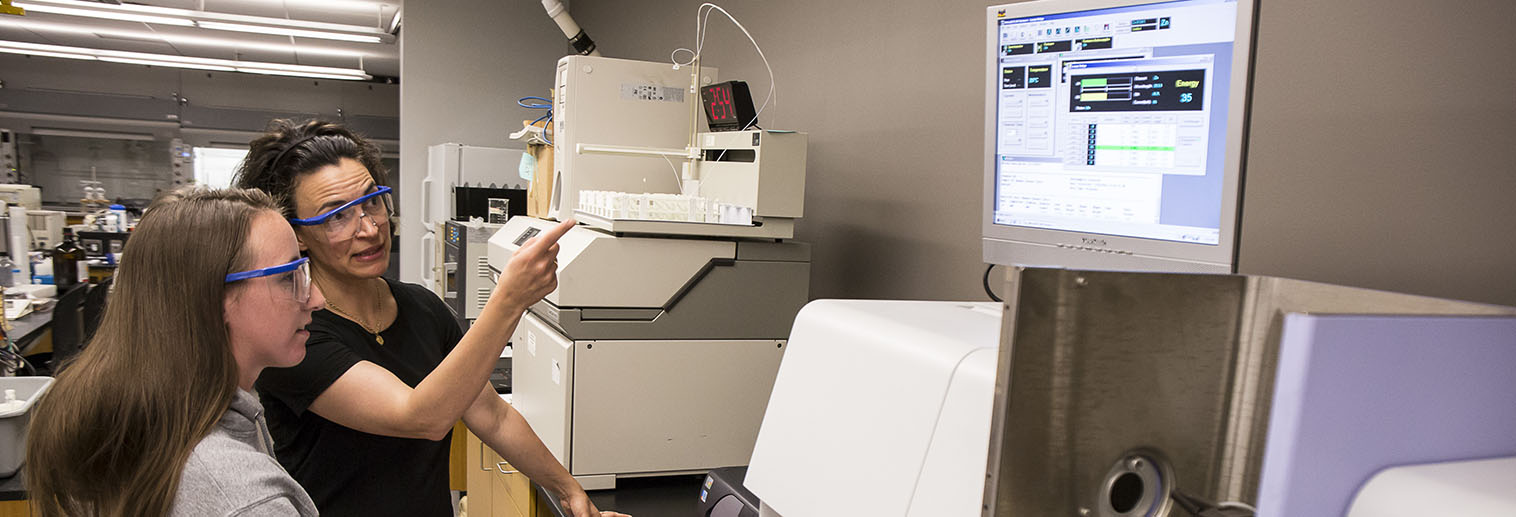SOAR Spotlight: Taylor Blake '16
Nucleotide Content Effect on the DNA-Binding of Metal Compounds
Major: Biochemistry, Sociology minor
Hometown: Nazareth, PA
Advisors: Drs. Shari and Steve Dunham
Briefly describe your project.
I’m looking at how differences in nucleotide content affect the binding of metal compounds to DNA. As you may remember, DNA is composed of four bases: adenine, cytosine, thymine, and guanine. These four nucleotides are different between different organisms. Metal compounds have been shown to bind to these bases, especially adenine and guanine, and form what we call crosslinks with the DNA. This crosslinks will block normal DNA processes and lead to cell death. We want to know if changing the ratio of these bases changes how, where, how much metal binds to the DNA. Today, there are metal-based chemotherapy treatments available for certain cancers. By doing these experiments we can gain insights into the mechanism of how these metal-based anticancer drugs work, allowing us to develop better therapies.
Why did you decide to turn your idea into a SOAR project?
Going into my senior year I really wanted to have an opportunity to do something “hands-on” in my major. I, therefore, was hoping I could do a SOAR project and work alongside some of the professors whom I had in class. I knew the Dunham’s were looking for SOAR students so I asked them if I could work with them and luckily for me they said yes.
How did your faculty advisor guide you through your research?
By working with both Dr. Shari and Dr. Steve I have access to a huge amount of experience and knowledge. They are always available to answer any questions I have and to help me in the lab. It is comforting to know that I can go to them and talk through any issues I am having. They not only care about my research but my success in and after Moravian.
What was your biggest obstacle?
Although we have many instruments, some of them have not been performing at the desired level which has slowed down my experiments. It is frustrating at times to have instrument problems! However, I did get to learn how a lot of the instruments I use work and how to troubleshoot problems.
What was your biggest takeaway from this experience?
Before this project, I still did not have an idea of “what I wanted to be when I grew up.” I knew I liked science (as a biochemistry major you have too!), but I did not know what I wanted to do with this love of science. Having the opportunity to work in a lab would aid me in narrowing-down my options of post-graduate experience; whether I enjoyed the research or didn’t I would still learn something. To my benefit, I have enjoyed this summer experience. I like being able to go into the lab, plan, and experiment and do some calculations, perform the experiment, and then see the results. It is exciting to use the knowledge that I have gained from my time at Moravian applied outside the teaching labs. The experiments we are running are not being done by other people and there is no preconceived outcome. You can study previous experiments, learn about everything involved, yet science can still shock you.
What was the result of your project? Was it congruent with your hypothesis?
One thing I’ve learned is that when you go out to learn something in research, you may get an answer to your question, but you will most likely end up with many more questions than answers! We are still working on answering the questions we outlined at the start of the summer, but I’m learning valuable skills along the way.
Will you expand on your research after this summer is over? If so, where would you like to see it go?
We are hoping to submit a late honors application so I can continue working on the research from this summer. After spending so much time and investing so much energy into this project, I would love to expand upon this research.

